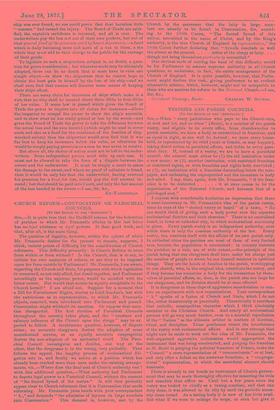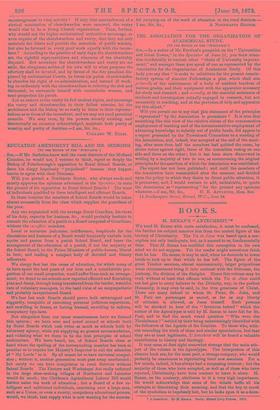VESIMIES AND PARISH COUNCILS. [TO THE EDITOR OF THE "SPECTATOR.']
SIR,—When "every parishioner who pays to the Church-rate, or scot and lot, and no other" (Burn), is a member of the parish vestry, and eligible to its every office, from churchwarden to parish constable, we have a body as unrestricted in franchise, and as equal in right, as can well be devised ; we have every house- hold, as represented by its chief (male or female, as may happen), taking direct action in parochial affairs, and liable to every paro- chial duty. If, instead of a vestry, we are to have a parochial council, the council must either be (1) the old institution under a new name ; or (2), another institution, with restricted franchise or restricted rights, or with franchise and rights both restricted ; or (3), an institution with a franchise descending below the rate- payer, and embracing the unpropertied and the immature in body and mind. I say, then, again, with Mr. Fremantle, "if the fran- chise is to be restricted it at once ceases to be the organisation of the National Church, and becomes that of a privileged sect."
I express with considerable hesitation an impression that there is some inaccuracy in Mr. Fremantle's idea of the parish vestry, since he says of the "elected vestry or board" of a town, "No one would think of giving such a body power over the separate ecclesiastical districts and their churches." There is no centralised board, in town or cathedral city, to which ecclesiastical suzerainty is given. Every parish vestry is an independent authority, over which there is only the common authority of the law. Every vestry, too, concerns itself with the affairs of its own parish only. In cathedral cities the parishes are most of them of very limited area, because the population is concentred ; in country districts the parishes, as a rule, are of wide extent,—the principle of the parish being that one clergyman shall have under his charge just the number of people to whom he can himself minister in spiritual things. They are the heads of families in the parish, worshipping in one church, who, in the original idea, constitute the vestry, and if they become too numerous a body for the transaction by them- selves of parochial affairs, so, then, is the parish also too large for one clergyman, and its division should be at once effected.
It is dangerous in these days of aggressive sacerdotaliam to ven- ture on experiments with new organisations. Your correspondent "A." speaks of a fusion of Church and State, which I do not like, either theoretically or practically. Theoretically it sacrifices that catholic, cosmopolitan character which I think absolutely essential to the Christian Church. And nearly all ecclesiastical persons will go very much further, even to a scornful repudiation of the " Nation " as the ultimate arbiter in matters of doctrine, ritual, and discipline. These gentlemen resent the interfereuce of the vestry with ecclesiastical affairs. And in any attempt that might now be made to work out the idea of Mr. Fremantle, the well-organised aggressive ecclesiastics would appropriate the instrument that was being constructed, and purging the franchise as M. Beale is purging the political franchise of France, make the " Council " a mere representation of "communicants," or at best, and only after a defeat on the narrower franchise, a "congrega- tional" representation, in which the sacerdotal element should dominate.
There is already in our hands an instrument of Church govern- ment that may be made thoroughly effective for removing the evils and scandals that afflict us. Until but a few years since the vestry was looked to chiefly as a taxing-machine, and that one duty done, it was allowed to lie idly by until the periodic neces- sity came round. As a taxing body it is now of but little avail. But what if we were to enlarge its scope, or even but give it
encouragement to vital activity ? If only that encroachment of a clerical nomination of churchwarden were removed, the vestry would rise to be a living Church organisation. Then, further, why should not the higher ecclesiastical authorities encourage, or even require of the churchwardens and vestry, that they not only maintain the fabric and provide the essentials of public worship, but also be forward in every good work equally with the incum- bent? According to the practice of early days, the churchwardens are the rightful representatives and almoners of the charitably disposed. But nowadays the churchwardens and vestry are set aside, the clergyman settles of his own will to what purposes the offertory shall be devoted, and by threat of the dire penalties dis- pensed by ecclesiastical Courts, he forces his parish churchwarden to abandon his right of co-administration, and instead of work- ing co-ordinately with the churchwardens in relieving the sick and distressed, he surrounds himself with controlable women, and semi-pauperises his parish.
Let us restore to the vestry its full ancient rights, and encourage the vestry and churchwarden in their fullest exercise, let the archdeacon and the bishop be as ready to listen to their refiresen- tations as to those of the incumbent, and we may not need parochial councils. We may even, by the powers already existing, and theoretically on occasion acknowledged, maintain both purity of worship and purity of doctrine.—I am, Sir, &c., COLLARD W. ELLIS.



































 Previous page
Previous page